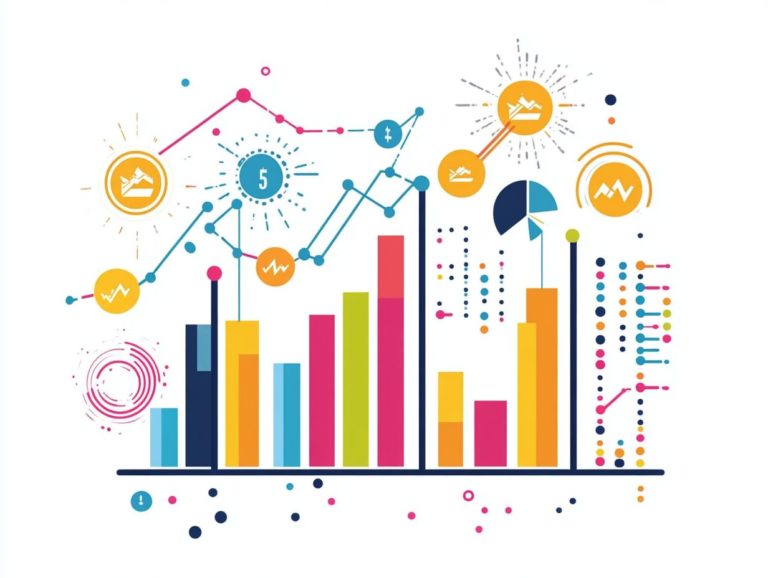The Benefits of CRM for Customer Service Teams
Customer Relationship Management (CRM) systems have fundamentally changed the way you engage with your customers, especially in the realm of customer service. CRM stands for Customer Relationship Management.
By utilizing CRM tools, you can significantly enhance customer satisfaction, streamline communication, and manage data with remarkable efficiency.
This article delves into the myriad benefits that CRM systems provide for customer service teams. It outlines effective implementation strategies and highlights essential metrics for measuring success.
Whether you re exploring CRM for the first time or seeking to optimize your existing setup, you ll discover exciting insights that can transform your approach today!
Contents
- Key Takeaways:
- What is CRM and How Does it Work?
- Benefits of CRM for Customer Service Teams
- Implementing CRM for Customer Service
- Measuring Success with CRM
- Frequently Asked Questions
- What is CRM and how is it beneficial for customer service teams?
- How can CRM improve customer service efficiency?
- What are the benefits of CRM for customer service teams in terms of customer satisfaction?
- How can CRM increase customer retention for businesses?
- Can CRM help improve team collaboration and communication?
- What are some other benefits of using CRM for customer service teams?
Key Takeaways:

- Enhanced customer satisfaction: CRM helps customer service teams provide personalized and timely support, leading to happier customers and increased loyalty.
- Efficient communication and collaboration: With CRM, teams can easily access and share customer information, improving response time and consistency in service.
- Streamlined data management: CRM organizes and centralizes customer data, making it easier for teams to access and analyze information for better decision-making and problem-solving.
What is CRM and How Does it Work?
Customer Relationship Management (CRM) systems are critical assets for managing your interactions and relationships with both current and potential customers.
These tools enable you to streamline processes, elevate customer service, and boost overall satisfaction by centralizing customer data, facilitating effective communication, and delivering insights into consumer behavior.
By leveraging CRM platforms like Salesforce, you can monitor your sales pipeline, analyze data trends, and implement customer-centric strategies that prioritize meeting your customers’ needs.
Grasping the mechanics of CRM can revolutionize your customer relationships and propel your business growth.
Benefits of CRM for Customer Service Teams
Implementing a robust CRM system offers a multitude of advantages for your customer service teams. It elevates their capacity to manage customer relationships with finesse and respond to inquiries with remarkable efficiency, especially when using CRM to enhance customer experience.
By embracing CRM solutions, your teams can meticulously track customer feedback, refine their communication processes, and deliver personalized interactions that cater to individual customer needs. This approach fosters stronger connections and drives significantly higher customer satisfaction rates.
Improved Customer Satisfaction
One of the primary advantages of leveraging CRM systems is the enhancement of customer satisfaction. These tools give you the power to deliver personalized interactions rooted in comprehensive customer data.
By analyzing historical data, you gain deeper insights into individual customer preferences. This allows you to tailor your communications with precision.
For example, if a customer frequently inquires about a particular product line, an effective CRM platform enables you to proactively send targeted information or exclusive offers related to those products.
Access to past purchase history allows for swift response management. When a customer reaches out with a query or issue, your support team can promptly provide relevant solutions.
This level of individualized attention fosters stronger relationships, making customers feel genuinely valued and understood.
Efficient Communication and Collaboration

CRM systems are your secret weapon for facilitating efficient communication and collaboration among team members. They ensure that customer inquiries and issues are addressed promptly and effectively.
These platforms integrate various communication tools seamlessly. This significantly enhances your teamwork.
By enabling real-time discussions and the effortless sharing of customer feedback, CRM systems empower your teams to remain aligned, no matter where they are located.
The collective insights drawn from customer interactions can be swiftly analyzed and acted upon. This guarantees that your responses are not only timely but also well-informed.
Ultimately, these collaborative features streamline your workflow management by breaking down silos. This allows for a more agile approach to customer service and significantly boosts overall productivity.
If you’re ready to transform your customer service experience, explore CRM solutions today or contact our team for more information!
Streamlined Data Management
CRM systems offer a major advantage by simplifying data management. You can organize and analyze customer information with ease.
This helps your sales team track client interactions and keeps customer service responsive.
By consolidating data points on one platform, teams can collaborate effectively. They gain access to complete customer profiles.
Data analysis is powerful; it gives you insights to identify trends and make smart decisions.
Automation features reduce manual entry and improve accuracy. Your team can focus on building relationships instead of administrative tasks.
Implementing CRM for Customer Service
Successfully implementing a CRM system for customer service requires careful planning, thorough training, and smooth integration with your existing business processes.
This approach enhances the system’s effectiveness and encourages user adoption.
Assess your specific Customer Relationship Management needs while exploring what features an effective CRM platform can provide.
Choosing the Right CRM System
Picking the right CRM system can supercharge your business goals! It should perfectly align with your specific needs and offer scalable solutions that integrate seamlessly with the tools you already use.
As you evaluate options, consider the flexibility of a cloud-based platform, which allows for remote access that modern businesses require.
Scalability is key; the CRM you choose must grow alongside your company, managing increased data and user demands without friction.
Integration capabilities are vital, too. A CRM that works harmoniously with your existing software enhances productivity. Platforms like Salesforce shine in this regard with robust integration features and user-friendly interfaces.
Training and Integration for Team Members

Effective training and integration for team members are crucial for a successful CRM implementation. It ensures everyone can leverage the system, enhancing collaboration and customer service delivery.
Prioritize comprehensive training sessions to lay a solid foundation for understanding the system’s functionalities. These sessions should evolve into ongoing workshops that cover various aspects of the CRM.
Provide readily available resources like user manuals and online support forums, empowering your staff to seek help proactively. This support alleviates frustration and cultivates a collaborative culture.
Ultimately, this leads to higher user adoption rates and optimizes the CRM’s collaborative potential.
Measuring Success with CRM
Measuring the success of your CRM system requires tracking key metrics that illuminate its influence on customer relationships, sales performance, and overall business growth.
By analyzing customer insights and using reporting tools, you can evaluate the effectiveness of your CRM strategies with precision. This approach helps you understand the impact of your efforts and guides you in refining your practices for optimal results.
Key Metrics to Track
To measure your CRM system’s effectiveness, track these key metrics: customer retention rates, sales forecasts, and customer satisfaction scores.
These metrics help you understand how well you manage customer relationships. They also empower you to make informed decisions about marketing strategies and operational processes.
For instance, monitoring customer retention rates reveals areas where your service might need fine-tuning. Meanwhile, precise sales forecasts guide your inventory and resource allocation.
Tracking customer satisfaction scores provides valuable insights into client perspectives. This ensures that your future campaigns effectively address their needs and preferences.
By focusing on these key performance indicators, you can refine your approaches, foster stronger relationships, and drive growth.
Adjusting and Improving CRM Strategy
Adjusting and refining your CRM strategy based on customer feedback and data analysis is essential for staying relevant and effective in today s ever-changing market.
Actively gathering insights from customers through surveys, reviews, and direct interactions helps you understand their preferences and pain points. This process helps you analyze the data and uncover trends that signal shifting expectations.
When you systematically analyze customer feedback, you can identify opportunities for enhancements that may not have been on your radar initially. This continuous refinement of your CRM strategies ensures your systems respond to customer needs and align with your broader organizational goals. Ultimately, it fosters long-term loyalty and satisfaction.
Frequently Asked Questions

What is CRM and how is it beneficial for customer service teams?
CRM means Customer Relationship Management. It s software that helps businesses manage customer interactions and data throughout their lifecycle. For customer service teams, CRM provides a centralized platform to store and access customer information, track interactions, and streamline communication. This results in better customer service and improved satisfaction.
How can CRM improve customer service efficiency?
CRM automates various processes such as data entry, task assignments, and follow-ups. This saves time and effort for customer service teams. It also provides real-time data and analytics, allowing teams to quickly respond to customer inquiries and resolve issues. This improves overall efficiency in customer service operations.
What are the benefits of CRM for customer service teams in terms of customer satisfaction?
CRM helps customer service teams deliver personalized and efficient service. With access to complete customer information, teams provide faster and more accurate responses, leading to higher customer satisfaction. Additionally, CRM helps teams track and address customer complaints and feedback, highlighting the benefits of user feedback in CRM to ensure a better overall experience.
How can CRM increase customer retention for businesses?
CRM enables customer service teams to build strong relationships by understanding customer needs and preferences. This leads to better communication and customized solutions, ultimately increasing customer loyalty. With improved retention, businesses can benefit from higher customer lifetime value and increased profits.
Can CRM help improve team collaboration and communication?
Yes, CRM provides a centralized platform for teams to store and access customer information. This makes it easier to collaborate and communicate effectively. Teams can assign tasks and track the progress of customer inquiries, ensuring a seamless flow of communication. This boosts overall team efficiency and productivity.
Explore CRM software options to enhance your customer service today!
What are some other benefits of using CRM for customer service teams?
Imagine supercharging your customer service with CRM’s powerful tools! CRM, or Customer Relationship Management, offers features like automated tasks, customizable dashboards, and integration with other tools.
This makes it a versatile and comprehensive solution for customer service teams. It helps teams identify and prioritize high-value customers.
It also allows teams to analyze data for better decisions and tracks the performance of customer service operations.
These benefits lead to delighted customers, increased satisfaction, and soaring business profits.






